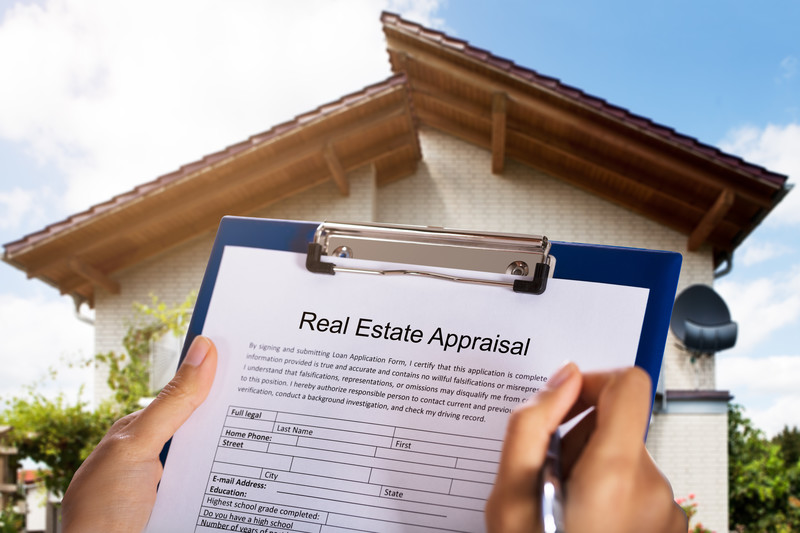What’s the Deal With Appraisals?

A property appraisal is a report that is ordered by a lender, which enables them to objectively assess the fair market value of the property. Lenders have appraisals done because ultimately they are staking the purchase and they don’t want to pay more for a property than what it’s worth on the existing market. Note that although lenders order the appraisal, it’s the buyer who pays for it.
While appraisals are primarily for the sake of lenders, property appraisals are helpful to buyers in situations where a seller prices their property too high (often for reasons that don’t have to do with market rates). They are also helpful to alert buyers as to when they’re getting a fair deal or—in cases where the appraisal comes in lower than the asking price—a great deal.
Appraisals are conducted by trained and licensed appraisers. Since the lender orders the appraisal, buyers and sellers have no say in who the appraiser will be. Lenders often keep a list of approved appraisers in areas where they lend. They’ll choose one off the list and provide the contact information so the appraisal can be scheduled by the seller.
The Differences Between an Appraisal and an Inspection
A lot of folks tend to mix up appraisals with inspections, but they aren’t the same thing. The first difference to be aware of is that an appraisal is conducted by an appraiser, while a home inspection is done by a home inspector. These are two different certifications for people who are trained to look for different things on the property. While there is some overlap regarding what’s covered, there are also some things that a home inspector looks at that an appraiser doesn’t, and vice versa.
Both a home inspector and an appraiser visually inspect the major systems of the property, including the HVAC, roofing and foundation. Beyond that, here are their respective areas of purview:
Home Inspector
– Provides a report outlining the condition and age of many things throughout the house, including cosmetic appearance and repair/replacement recommendations. In our business, this report is paid for by the buyer, who is then given the report for review.
Appraiser
– Researches the sales comps in the area and includes that research in their subsequent report
– Submits a report to the buyer, lender and seller that details how they arrived at their final number
Another big difference between an appraisal and an inspection is that an appraisal is always part of a real estate transaction, whereas an inspection isn’t. An appraisal is always ordered by the lender. The lender never orders an inspection; it’s at the option and expense of the buyer.
The job of an appraiser is to calculate the fair market value of the property. The job of an inspector is to report on the age and condition of things throughout the property and to make recommendations for repairs or replacements based on those findings.
When an Appraisal is Surprising
Appraisals should come in at or near the selling price of a property. However, often the appraisal comes in high or low. When it comes in high, the seller isn’t obligated to sell at their original asking price. They may back out of the sale and then raise their asking price based on the high appraisal. However, in the case of a turnkey rental from MartelTurnkey, if an appraisal comes in higher than the asking price, we’re more than happy to complete the sale. We’re delighted when our value-added renovations have increased the value of our turnkey rentals to the point where our buyer gets automatic equity!
Generally, when an appraisal comes in lower than the asking price, there’s a decision to be made. The seller either needs to lower their price because the lender won’t lend enough for the buyer to complete the sale; or the seller must add additional funds to cover the gap. Some sellers won’t budge on price or add additional funds, in which case whole deal may fall apart.
If an appraisal comes in too low on a turnkey rental property from MartelTurnkey it’s not a problem. We are willing to either improve the property further so a second appraisal comes in higher, or we can adjust the selling price to match the appraisal.
Why Appraisals Matter
Appraisals are important to everyone; the lender, the seller and the buyer. But no one benefits more from the appraisal than the buyer. The appraisal has a lasting impact on the buyer’s experience of owning that property. First, of course, it directly impacts whether the lender will lend them the money to buy in the first place. Then it impacts whether they’re getting a fair deal from the seller. But down the line, the appraisal impacts how much property tax and how much property insurance they’ll pay for the entire time they own that property. The town’s tax assessor uses the appraisal to calculate taxes. Homeowner insurance companies use the appraisal to determine the replacement cost and calculate premiums.
Even more so, if the property owner goes for a loan in the future, or wants to become an accredited investor, the appraisal will be used to determine the value of the asset—the property.
Now, appraisals can change. New appraisals supersede previous appraisals. Obviously, if the market goes up, the value of the property goes up. New appraisals can be ordered by the owner at any time for any reason. When an owner is ready to refinance or apply for an equity loan, the prospective lender will likely order a new appraisal.
At MartelTurnkey, our goal is to sell turnkey rentals at fair market value to our investors. But in those rare circumstances when an appraisal comes in low, we’re willing to work with you to make it right. If you’d like to learn more about what it’s like to work with us, we’d be happy to chat with you. Send us an email or schedule a call.